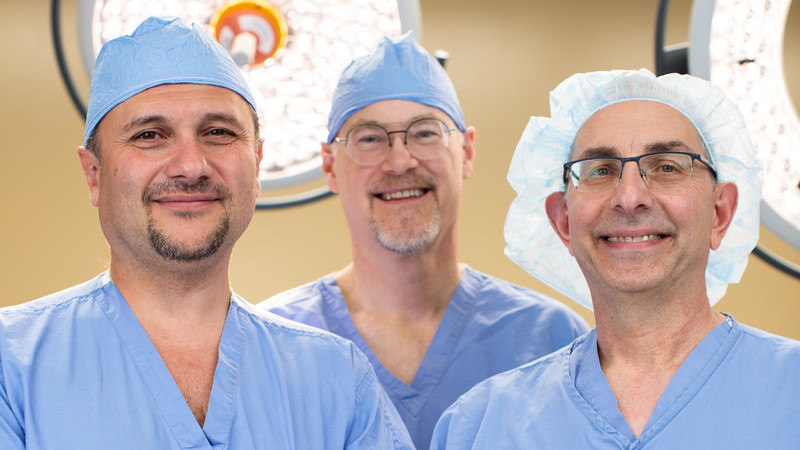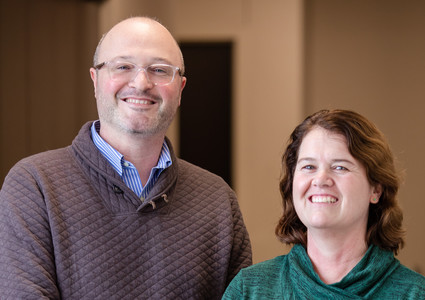




The Meaning of Care Magazine
Fighting a Crisis, Improving Care
Published: March 18, 2020

She had never had surgery and had never taken an opioid for pain. She was nervous about the prospect of both. But her head and neck surgical oncologist, William Lydiatt, MD, at Methodist Estabrook Cancer Center (MECC), followed a protocol that would help her avoid opioids.
Thanks to a presurgical drug cocktail of acetaminophen, gabapentin and a nonsteroidal anti-inflammatory drug (NSAID), Mary Kay went home just hours later, where she alternated acetaminophen and ibuprofen for pain and never needed an opioid.
Mary Kay’s is a success story for Methodist’s multimodal approach to pain management and opioid reduction efforts. Since creating the Opioid Guardianship program in 2017, Methodist has made significant reductions in opioid prescriptions and usage. Through innovations in surgical pain management, analysis of prescribing practices and a commitment to working together, Methodist is changing patient care for the better and potentially saving lives.
A Better Way to Treat Pain
Even before the opioid crisis was declared a national health emergency in 2017, Methodist was exploring non-opioid alternatives to managing pain and implementing enhanced recovery after surgery (ERAS) protocols. Multimodal approaches were pioneered in colorectal surgery.
“Colorectal kind of spearheaded trying to get people in and out of the hospital safely but quickly,” said Garnet Blatchford, MD, colorectal surgeon and chief of surgery at Methodist Hospital. “If we give people lots of opioids, then their gut doesn’t wake up after surgery.”
Other adverse side effects to opioids include sleepiness, constipation, dizziness, nausea and vomiting. What began in colorectal surgery soon gained traction in the MECC head and neck group.
In 2015, MECC head and neck surgical oncologist Oleg Militsakh, MD, worked with Methodist Hospital anesthesiologist Mark D’Agostino, MD, and anesthesiology service coordinator Brittany Kauffman, BSN, RN, CPAN, to develop a drug protocol to decrease the harmful side effects caused by opioids. Initially seen as a risk due to a belief that NSAIDs cause bleeding, the drug protocol was ultimately proven safe. They never anticipated it would also eliminate the need for opioids in most cases.
“What you needed were surgeon champions,” Dr. D’Agostino said. “You needed people that were convinced that treating pain with solely opioids was not good, and that you need to use other modalities.”

“We’re looking holistically at the patient,” said Dr. Lydiatt, vice president of medical affairs and chief medical officer at Methodist Hospital. “It’s important to understand this isn’t just about reducing narcotics. This is about more effective management of pain with fewer side effects. Patients will get better care because they will recover more quickly.”
ERAS protocols have spread throughout the health system, and oral opioid reduction rates in the hospital demonstrate the success. From 2017 to 2019, Methodist Hospital saw an 11% reduction while Methodist Jennie Edmundson Hospital saw a 27% reduction. Methodist Women’s Hospital saw a 49% reduction in that same time period.
“OK, We Have to Be Doing Something Different”
The work being done with ERAS protocols has also contributed to fewer outpatient opioid prescriptions. Across the system, obstetrics-gynecology saw a decrease of 61% from 2017 to 2019. In the same period, general surgery had a decrease of 58% and emergency medicine saw a reduction of 42%.
At Methodist Jennie Edmundson, OB/GYN Maureen Boyle, MD, had a wake-up call in 2017 when the OB department was told that it prescribed the second highest amount of opioids at the hospital.
“The OB administration really took control and saw this as a problem,” Dr. Boyle said. “Just by making that known, it was enough for us to say, ‘OK, we have to be doing something different.’”

Joshua Dahlke, MD, a maternal-fetal medicine specialist at Methodist Women’s Hospital Perinatal Center, credits Dr. Boyle with galvanizing changes in OB throughout the system. And it’s clear why opioid reduction in OB is important.
“In obstetrics, if we perform a cesarean and you’ve never had narcotics before in your life, roughly one in 300 of those women will be addicted after delivery,” Dr. Dahlke said. “That kind of puts it in perspective when you think of roughly 5,000 deliveries at this hospital divided by 300. You know there’s dozens of women just after standard deliveries that could potentially become addicted by doing nothing but having a child.”
Getting nurses on board in OB and other specialties was also key.
“It’s engrained in you in nursing school to ask patients about pain,” said Pam Haschke, MSN/MBA, BSN, RN, NE-BC, surgical services operations leader at Methodist Hospital. “After a while, when people ask you the same question over and over again, you start thinking, ‘OK, maybe I am having pain.’ So we’ve started to ask them their comfort level.”
“For a number of years, we treated pain in a way that we wanted to eliminate it,” said Cheryl Bohacek, MSR-RN, OCN, oncology service leader at Methodist Hospital. “Narcotics are still a tool in our pocket, but they’re definitely not the first thing we reach for.”
Building on Success
While the reduction rates are impressive, they aren’t the only way to measure success. And for many patients, opioids are still necessary for pain.
“The end goal is to maximize the benefits of opioid pain medications while minimizing risk and avoiding harm from their use – not to eliminate them altogether,” said Chad Reade, MD, an internal medicine physician at Methodist Physicians Clinic HealthWest.
Dr. Reade said that Methodist Physicians Clinic uses the best evidence and safest practices to treat patients with acute opioid needs from surgery or injury and those who need opioids for chronic pain.
“The big picture is doing what’s best for patients,” he said.
In addition to preventing first contact with opioids and reducing the number of pills in medicine cabinets and on the streets, Methodist is improving how it treats patients already addicted to opioids. Dr. Dahlke is the only OB/GYN in Nebraska who is certified to prescribe maintenance medications for pregnant women with opioid use disorder. He also advocates for mental health care for his patients and believes that opioid use disorder should be treated like any other chronic disease.
Psychiatrist John Franzen, MD, at Methodist Fremont Health agrees that people should treat addiction as a chronic illness.
“If somebody had heart disease or diabetes, they would get seen by their provider or a specialist,” he said. “However, with mental health and addiction-related issues, there is a certain stigma associated with getting treatment that can be a barrier for a lot of people. With the right support, strategies and treatment, people get better and greatly improve their quality of life.”
Dr. Franzen said Methodist Fremont Health is exploring program development for patients who have co-occurring mental health and addiction disorders.
“Our goal is to reduce barriers to getting treatment and to provide care that can be transformational and not just transactional,” he said.
Working Together Across the System
Successful opioid reduction and the growing use of multimodal pain management depends on Methodist working together as a system.
“You have to have everybody buy into this concept,” Dr. Militsakh said. “You can’t do it as a single physician or even a single group. It has to be an organizational effort.”
Methodist has also shown its commitment to innovation.
“I think we do a very excellent job of innovation and pushing quality outcomes,” Dr. Lydiatt said. “I believe this is just one of many initiatives that really focuses first and foremost on what the patient needs and how we can better achieve.”
Ultimately, success is about patient engagement and satisfaction, and better patient care.
“In my mind, The Meaning of Care encompasses the whole patient,” said Elizabeth Becker, director of performance improvement and quality at Methodist Jennie Edmundson. “That’s not just their physical illness or their diagnosed illness. That’s their emotional health, that’s their physical health, that’s their mental health. By making these choices internally in our hospitals, we’re able to help patients make good choices outside of the hospital and reach their best level of health.”

Mary Kay appreciates Methodist’s efforts. She’s relieved she didn’t need opioids. Even better, her nodules were benign.
“You go into something like this knowing you’re going to have discomfort and pain,” she said. “There’s just a level of trust with your care provider. There’s trust with the Methodist system. Everybody wants this to be successful. On every level, they want my experience to have a positive outcome.”
Photos by Daniel Johnson
More Resources
- Learn more about pain management and addressing anxiety.
- Read how one young man's thyroid cancer diagnosis changed his life.
- Read more from the spring 2020 issue of The Meaning of Care Magazine.


